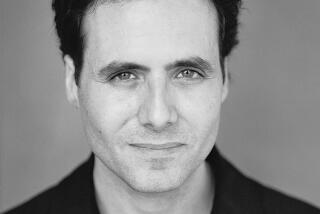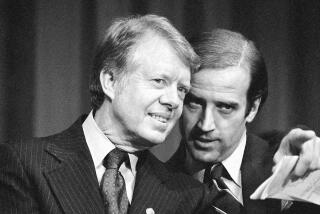Forget the Free World, Can Clinton Control the Story?
WASHINGTON — One of the computer culture’s most useful gifts to American life has been the concept of virtual reality, which perfectly captures the spirit of all sorts of modern-day cultural and political doings. Take the U.S. presidency. Analysts of the institution used to fret about how presidents could successfully control Congress--or the economy, or the Soviet menace. Now, however, we know the fundamental question about any president: Can he control the story line? President Bill Clinton, despite his strenuous efforts, cannot. Actually, he’s so bad at it that the ghost of Richard M. Nixon seems to be hovering over his head, like Al Capp’s famous little black cloud. But the trouble is not wholly Clinton’s fault.
Last week, the president hosted the major industrial nations’ economic summit in Denver. It was a perfect place to project an aura of statesmanship. The summit brought President Boris N. Yeltsin to the table, thus marking a significant step in the integration of the new Russia into the West. Clinton discussed weighty topics with his fellow world leaders. He differed in a dignified way with the Europeans about predictable issues, such as pollution clean-up (they want faster, we want slower) and troop withdrawal from Bosnia (they want slower, we want faster). On many matters, there was consensus.
But somewhere in the Clinton White House, directing the president’s public appearances, sits an anti-Deaver with a blind, mole-like inability to create and maintain a presidential mood for more than 30 seconds. That is why journalists at the Denver summit received in their press kits “President Clinton’s Economic Report Card,” including a list titled “Best Since.” It credited Clinton with the rise in the stock market, the happy state of consumer confidence and the largest deficit reduction since Harry S. Truman. This last claim omitted the fact that for several years in question, there was no deficit reduction because the deficit was already at zero. The amateurism was impossible to ignore.
Still, not all of Clinton’s inability to look presidential can be laid at the anti-Deaver’s door. Also at work is an impressively unfortunate combination of personal history and bad luck.
For example, there was Clinton on the very morning of the summit wrap-up, with its golden opportunity for triumphant press conference and big photo op, when the Supreme Court delivered its second slap to the face of presidential power in as many months.
In May, Clinton was in Paris, doing heavy diplomatic lifting and preparing to sign a treaty with Russia, when the court handed down its decision in the Paula Corbin Jones case. The opinion asserted that the president’s role in our political system was not important enough to protect him from being sued. Clinton’s alleged behavior with Jones, if true, was, of course, his own fault. But the timing of the decision can be attributed only to the political gods’ hankering for a little joke.
The more recent court action, on the heels of the Denver summit, involved the issue of attorney-client privilege. Hillary Rodham Clinton, under investigation for her role in Whitewater, held discussions with government lawyers working in the White House about her grand-jury testimony and an interview of her by prosecutors. Independent Counsel Kenneth W. Starr wanted the notes. The White House claimed attorney-client privilege. A lower court ruled against the White House, which appealed. Last week, the Supreme Court refused even to hear the Clintons’ case, and the White House turned the notes over to the independent counsel. Within a day, the Associated Press had a story on the substance of Hillary Clinton’s grand-jury testimony, in which she blamed the woman who handled her mail for the two-year delay in handing over the documents.
It was most assuredly the Clintons who got themselves into the Whitewater tangle; but when it came to last week’s coincidence of events, you could hear those gods snickering again.
There is a pattern here. Clinton is the guy who, on the eve of the New Hampshire primary in 1992, found himself with Gennifer Flowers on his and everybody else’s doorstep. In 1996. as he was about to accept the nomination for a second term, the world learned of the confidence-betraying sexual habits of his political consultant Dick Morris. The bad luck at work here is pervasive.
The effects of this ill fortune are also pervasive. Clinton has his hands firmly on the levers of power. He does not have to face reelection trauma. He does not suffer from a bad case of lame-duck disease, partly because no clear successor has yet emerged among Democrats. Whatever the future course of the Whitewater, Jones and campaign-finance scandals, no one suggests he is in real danger of being impeached or prevented from filling out his term. He does not have to cope with concerted political abuse from Republicans, because they have fallen into a state of what may politely be called disarray.
Yet, as Clinton is clearly aware, none of these is the story and none is likely to be the verdict of history, at least in the short term. That is why he so often talks about his “firsts” and “bests.” That is why, on the day the Denver summit ended, he appeared not triumphant but weary and frustrated, using his speeches to decry what he spoke of as the dark, cynical mood of Washington, which is, to put it another way, wallowing in Whitewater.
None of this makes Clinton a Nixon or portends a similar fate for him. Indeed, it is tempting to react to Clinton’s troubles by peppering him with one prescription or another for wrenching the narrative line of his administration out of its current path and turning it to his advantage. This is, though, the 25th anniversary of the Watergate break-in. Nixon is on the collective mind. In Clinton’s weary voice, it is hard not to hear the echoes of another president who had an enormous political intelligence, knew every piece of political lore, was capable of political calculations of immense complexity--and yet had to watch as his own personal past and temperament, plus events whose internal logic gradually gathered the momentum of an avalanche, simply rolled over all his efforts to exercise control.
When this process overtook Nixon, the consequences were vast and sometimes tragically violent--not only for this country but for other areas of the world, chief among them Southeast Asia. With Clinton, the nation is highly unlikely to suffer such traumas. In that, at least, he and we are enjoying a bit of luck.
More to Read
The biggest entertainment stories
Get our big stories about Hollywood, film, television, music, arts, culture and more right in your inbox as soon as they publish.
You may occasionally receive promotional content from the Los Angeles Times.










